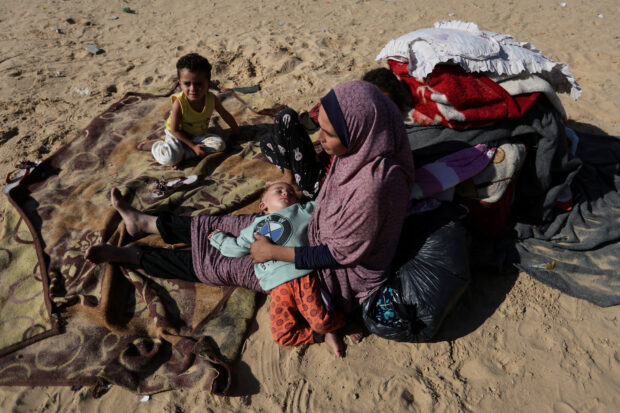WHO: Gaza’s ‘catastrophic’ health situation nearly impossible to improve

A woman sits with children outside, as displaced Palestinians, who fled their houses due to Israeli strike, shelter in a camp in Rafah, amid the ongoing conflict between Israel and Palestinian Islamist group Hamas, in the southern Gaza Strip, December 6, 2023. REUTERS/Ibraheem Abu Mustafa/File Photo
GENEVA – The World Health Organization (WHO) chief said Sunday it would be all but impossible to improve the “catastrophic” health situation in Gaza even as the board passed an emergency WHO motion by consensus to secure more medical access.
Palestinian officials have also described a disastrous health situation in Gaza, where Israel’s assault has left most of the population homeless, with little electricity, food, or clean water, and a medical system facing collapse.
The emergency action, proposed by Afghanistan, Qatar, Yemen, and Morocco, seeks passage into Gaza for medical personnel and supplies and requires the WHO to document violence against healthcare workers and patients and to secure funding to rebuild hospitals.
“I must be frank with you: these tasks are almost impossible in the current circumstances,” WHO Director-General Tedros Adhanom Ghebreyesus said. Still, he commended countries for finding common ground, saying it was the first time any U.N. motion had been agreed by consensus since the conflict began.
READ: Israel tanks storm Khan Younis in new push in south Gaza
Tedros told the 34-member board in Geneva that medical needs in Gaza had surged and the risk of disease had grown, yet the health system had been reduced to a third of its pre-conflict capacity.
Mustafa Barghouti, a Palestinian politician who heads the Union of Palestinian Medical Relief Committees with 25 teams working in Gaza, said: “Half of Gaza is now starving.”
He said 350,000 people had infections, including 115,000 with severe respiratory infections and a lack of warm clothes, blankets, and protection from the rain.
He said many were suffering from stomach complaints because there was little clean water and not enough fuel to use to boil it, risking outbreaks of dysentery, typhoid, and cholera.
“To add insult to injury, we have 46,000 injured people who cannot be treated properly because most of the hospitals are not functioning,” he said.
Bombardment
Gaza hospitals have come under bombardment and some have been besieged or raided as part of Israel’s response to Hamas’ deadly Oct. 7 attacks. Hospitals that remain open are overwhelmed by the numbers of dead and wounded arriving and sometimes procedures are carried out without anesthetics.
READ: Israel keeps bombarding Gaza, even areas it calls safe zones for Palestinians
A WHO database shows there have been 449 attacks on healthcare facilities in Palestinian territories since Oct. 7, without assigning blame.
Tedros said that it would be hard to meet the board’s requests given the security situation on the ground and said he deeply regretted that the United Nations Security Council could not agree on a ceasefire in Gaza following a US veto.
“Resupplying health facilities has become extremely difficult and is deeply compromised by the security situation on the ground and inadequate resupply from outside Gaza,” he said.
Palestinian Health Minister Mai al-Kaila deplored the critical shortages of medicines. “The urgency of the situation cannot be overstated,” she told the WHO meeting by video link.
READ: Hundreds more Palestinians killed in Israel’s assault on Hamas in south Gaza
WHO board member the United States signaled in the meeting that it would not oppose the text of the motion which was adopted without a vote later on Sunday.
The motion was criticized by Israel, which has said it puts disproportionate focus on Israel, made no mention of the Israeli hostages in Gaza and does not address what Israel describes as Hamas’ use of civilians as human shields, by placing command centers and weapons inside hospitals.
Israeli ambassador Meirav Eilon Shahar called the adopted text a “complete moral failure.” Israel is not a WHO board member.
WHO emergency sessions are rare and have occurred during health crises, including during the COVID-19 pandemic in 2020 and during West Africa’s Ebola epidemic in 2015. Qatar, which has mediated in the Israel-Hamas conflict, chaired the session.